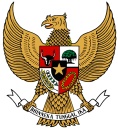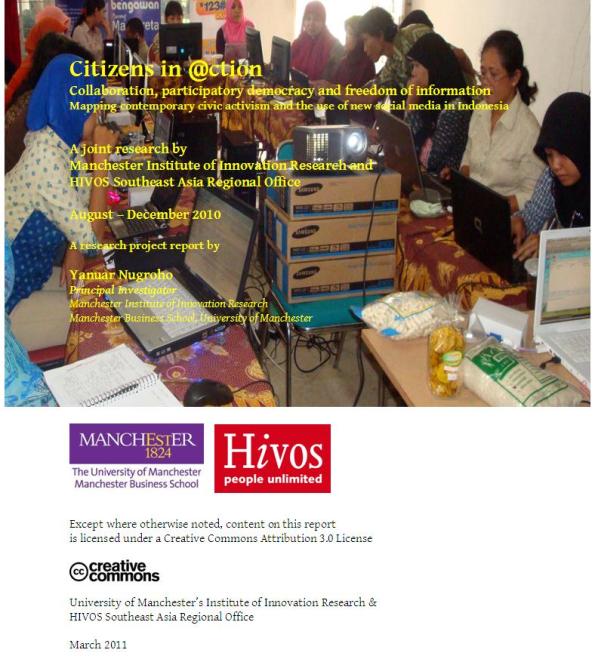amanah baru
 Tanggal 20 maret 2015 saya menerima amanah baru sebagai Deputi II Kepala Staf Kepresidenan melalui Keputusan Presiden No. 32/M Tahun 2015. Tugas saya adalah membantu tugas Kepala Staf Kepresidenan di bidang analisis dan pengelolaan program prioritas pembangunan nasional. Ini adalah amanah yang tidak mudah dan tidak ringan. Bahkan sesungguhnya ini adalah tanggung jawab yang amat besar.
Tanggal 20 maret 2015 saya menerima amanah baru sebagai Deputi II Kepala Staf Kepresidenan melalui Keputusan Presiden No. 32/M Tahun 2015. Tugas saya adalah membantu tugas Kepala Staf Kepresidenan di bidang analisis dan pengelolaan program prioritas pembangunan nasional. Ini adalah amanah yang tidak mudah dan tidak ringan. Bahkan sesungguhnya ini adalah tanggung jawab yang amat besar.
Karena itu, dengan rendah hati saya mohonkan dukungan rekan-rekan sekalian agar saya bisa mengemban amanah ini dan memenuhi tanggung jawab saya sebaik-baiknya, demi upaya mendorong kemajuan negeri yang kita cintai ini.
Salam,
y
Rehat
 Sejak memulai studi doktoral tahun 2004, nyaris tak ada jeda dalam hidup saya. Usai PhD akhir 2007, saya langsung menjadi post-doc fellow, lalu delapan bulan kemudian diangkat menjadi Research Associate, dipromosikan sebagai Research Fellow tahun 2010, dan Lecturer B tahun 2012. Semuanya di University of Manchester. Belum juga pekerjaan sebagai Lecturer B (satu step sebelum Senior L) dimulai, saya ditarik pulang kembali ke tanah air untuk bergabung sebagai Asisten Ahli Kepala Unit Kerja Presiden bidang Pengawasan dan Pengendalian Pembangunan (UKP4) sejak Oktober 2012. Duapuluh lima bulan setelahnya adalah hidup profesional yang sangat intensif karena bekerja di jantung saraf republik. Karena keluarga tinggal di Jogjakarta, maka meretas jarak Jakarta-Jogja sebulan sekali atau dua kali menjadi bagian dari hidup. Setahun terakhir ini malah meretas jarak setengah bola dunia sebagai bagian dari tim negosiator Indonesia untuk PBB dalam penyusunan agenda pembangunan global pasca-2015 yang mengharuskan seminggu dalam sebulan sejak Desember 2013 sd September 2014 bekerja di New York.
Sejak memulai studi doktoral tahun 2004, nyaris tak ada jeda dalam hidup saya. Usai PhD akhir 2007, saya langsung menjadi post-doc fellow, lalu delapan bulan kemudian diangkat menjadi Research Associate, dipromosikan sebagai Research Fellow tahun 2010, dan Lecturer B tahun 2012. Semuanya di University of Manchester. Belum juga pekerjaan sebagai Lecturer B (satu step sebelum Senior L) dimulai, saya ditarik pulang kembali ke tanah air untuk bergabung sebagai Asisten Ahli Kepala Unit Kerja Presiden bidang Pengawasan dan Pengendalian Pembangunan (UKP4) sejak Oktober 2012. Duapuluh lima bulan setelahnya adalah hidup profesional yang sangat intensif karena bekerja di jantung saraf republik. Karena keluarga tinggal di Jogjakarta, maka meretas jarak Jakarta-Jogja sebulan sekali atau dua kali menjadi bagian dari hidup. Setahun terakhir ini malah meretas jarak setengah bola dunia sebagai bagian dari tim negosiator Indonesia untuk PBB dalam penyusunan agenda pembangunan global pasca-2015 yang mengharuskan seminggu dalam sebulan sejak Desember 2013 sd September 2014 bekerja di New York.
Tanggal 30 November 2014, term kerja saya dengan UKP4 berakhir. Dan saya putuskan untuk mengambil jeda. Istirahat sejenak. Ke Jokjakarta. Berkumpul kembali dengan keluarga. Sembari mengendapkan seluruh pengalaman dan keterlibatan yang sudah diperoleh selama ini. Baik pengalaman profesional dan personal. Baik keterlibatan rasional maupun keterlibatan afektif. Lalu memikirkan apa yang akan saya lakukan ke depan. Bersama dengan keluarga. Dan bersama orang(-orang) yang saya cintai dan mencintai saya.
Kata Soe Hok Gie dalam puisinya “Mandalawangi-Pangrango (1967)”:
“Hidup adalah soal keberanian,
Menghadapi yang tanda tanya
Tanpa kita bisa mengerti, tanpa kita bisa menawar
Terimalah, dan hadapilah”
Jokjakarta, 2 Desember 2014.
PS. Setelah sekian lama tidak ngeblog, mungkin selama rehat ini, saya punya waktu lebih banyak untuk menulis. Mungkin. Jelas ini bukan janji 🙂
#sewindu bersama @arumdati
 #sewindu mengarungi bahtera rumahtangga bersama
#sewindu mengarungi bahtera rumahtangga bersama @arumdati. mencoba setia saling menemani, menyemangati & menguatkan dlm jalan peziarahan ini.
1. “amantium irae amoris integratio est – pertengkaran dua kekasih akan memperbarui cinta mereka.” -Terence; dikutip oleh Winston Churchill
2. “si vis amari, ama – jika kamu ingin dicintai, cintailah.” – seneca philosophus, epistulae
menerawang masa depan di TFSC
 Tulisan saya bersama Ozcan Saritas tentang “menerawang masa depan”, tampil di jurnal bergengsi (bintang 3) Technological Forecasting and Social Change – TFSC (Vol 79 (3) March 2012, Pages 509–529). Tulisan ini adalah analisis lebih lanjut tentang data yang kami gunakan dalam paper tahun 2009 ketika kami menggabungkan Network Analysis dengan foresight. Kalau dalam paper 2009 kami lebih berkutat pada metodologi, maka pada paper ini kami berfokus pada data dan interpretasinya.
Tulisan saya bersama Ozcan Saritas tentang “menerawang masa depan”, tampil di jurnal bergengsi (bintang 3) Technological Forecasting and Social Change – TFSC (Vol 79 (3) March 2012, Pages 509–529). Tulisan ini adalah analisis lebih lanjut tentang data yang kami gunakan dalam paper tahun 2009 ketika kami menggabungkan Network Analysis dengan foresight. Kalau dalam paper 2009 kami lebih berkutat pada metodologi, maka pada paper ini kami berfokus pada data dan interpretasinya.
artikel di journal Foresight Rusia
 Saya tak menyangka bahwa tulisan kolaborasi metodologis eksperimentatif menggabungkan Social Network Analysis ke dalam metodologi Foresight yang dimuat di Jurnal “foresight” tahun 2009 kini menjadi banyak didiskusikan. Saya dan co-author saya, Ozcan Saritas, diundang ke banyak konferensi dan seminar untuk mempresentasikan tulisan ini. Nampaknya ketertarikan (dan kritik) banyak orang pada tulisan tersebut terletak pada dua hal: (1) bagaimana kami ‘nekat’ menggabungkan kedua metode tersebut, dan/atau (2) data yang dan temuan yang ‘menghentak’ 🙂
Saya tak menyangka bahwa tulisan kolaborasi metodologis eksperimentatif menggabungkan Social Network Analysis ke dalam metodologi Foresight yang dimuat di Jurnal “foresight” tahun 2009 kini menjadi banyak didiskusikan. Saya dan co-author saya, Ozcan Saritas, diundang ke banyak konferensi dan seminar untuk mempresentasikan tulisan ini. Nampaknya ketertarikan (dan kritik) banyak orang pada tulisan tersebut terletak pada dua hal: (1) bagaimana kami ‘nekat’ menggabungkan kedua metode tersebut, dan/atau (2) data yang dan temuan yang ‘menghentak’ 🙂
dari home-education summer festival 2011
 Akhir Juli 2011 kami sekeluarga mengikuti Home-Education Summer Festival (HESFES) 2011 di Rougham, Ipswich. Kami memang (setidaknya saat ini) memilih meng-home-educate kedua anak kami. Dan inilah pertama kalinya kami mengikuti festival ini. Rame, gayeng.
Akhir Juli 2011 kami sekeluarga mengikuti Home-Education Summer Festival (HESFES) 2011 di Rougham, Ipswich. Kami memang (setidaknya saat ini) memilih meng-home-educate kedua anak kami. Dan inilah pertama kalinya kami mengikuti festival ini. Rame, gayeng.
Saya dan istri saya, Ira, berkolaborasi menulis pengalaman keikutsertaan kami di acara tersebut. Silakan simak di blognya.
Salam,
y
An innovation perspective of knowledge management in a multinational subsidiary
Journal of Knowledge Management, 15(1):71-87
1. Introduction
Organisations nowadays have been faced with the challenges of managing increasingly more complex activities in the knowledge-based economy. As Castells (2000) suggests, knowledge economy is characterised as being informational, global and networked. In his view, information and knowledge plays an important role in modern economy, giving new perspective to the works of some earlier economists who had already hinted this issue, such as Marshall (1965), Hayek (1945) and Schumpeter (1951, 1952). The consequence of this is clear: organisations working in knowledge economy cannot but conceive themselves as learning agents capable of creating and managing knowledge to achieve their purpose (Antonelli, 2008).
Exploring Knowledge Management in Civil Society Organisations
 Exploring Knowledge Management in Civil Society Organisations: Sustaining Commitment, Advancing Movement
Exploring Knowledge Management in Civil Society Organisations: Sustaining Commitment, Advancing Movement
by Yanuar Nugroho and Mirta Amalia
Manchester Business School (MBS) Working Paper No. 600
Manchester Institute of Innovation Research (MIOIR) Working Paper No. 56
This paper is currently under review in the International Conference of Knowledge Management and Information Sharing (KMIS), part of IC3K (International Joint Conference on Knowledge Discovery, Knowledge Engineering and Knowledge Management), Valencia, Spain 25-28 October 2010, and is being revised for a journal submission.
Abstract
Civil society organisations (CSOs) have recently attracted much research attention, as they have become more central in social as well as economic and political dynamics, challenging and shaping the work of the state/public organisations and of the private institutions. Despite the fact that they are actually knowledge-intensive organisations, CSOs –like any other organisations– are faced with new challenges due to the advent of knowledge economy. Knowledge-capital in CSOs is highly diverse and this affects both the organisational performance and the civil society movement within which they are part of. Most of the knowledge in CSOs that has been driving and characterising civil society activities and realms is tacit in nature and is largely unmanaged. Consequently, in the long run, the organisations and their movement often become unstable despite efforts to manage their activities. We use the works of Polanyi and Nonaka to help address this problem and conceptualise the corpus of knowledge in CSOs. To anchor this conceptualisation, we feature the case of Indonesia where CSOs in a latecomer economy have been significantly influencing the work of public and private sectors. We find that managing tacit knowledge has been crucial to sustain the engagements with beneficiaries and networks. We propose taxonomy to understand different types of knowledge in CSOs and suggest a guiding principle to strategically manage it.
Full paper
available for download from here
Comments are most welcome! 🙂
Knowledge Management in Multinational Subsidiary in Indonesia: A lesson learned
 Last year, among the students I was supervising, was a brilliant student from Indonesia who finally got her MSc with distinction: Mirta Amalia. Her dissertation explored and investigated the ways in which a multinational company susbsidiary devised and implemented the knowledge management strategy. It was a very interesting dissertation. She found fascinating empirical data on the importance of “enabling session” which was arguably vital in the process of tacit knowledge transfer within the company. However, she noted that this scheme was at large at risk as there had been no clear prioritisation.
Last year, among the students I was supervising, was a brilliant student from Indonesia who finally got her MSc with distinction: Mirta Amalia. Her dissertation explored and investigated the ways in which a multinational company susbsidiary devised and implemented the knowledge management strategy. It was a very interesting dissertation. She found fascinating empirical data on the importance of “enabling session” which was arguably vital in the process of tacit knowledge transfer within the company. However, she noted that this scheme was at large at risk as there had been no clear prioritisation.
I can keep on and on and on talking about her dissertation, but I’d better stop here. Contact her directly if you want to read her intriguing dissertation. What I want to say is that the way she formulated and wrote the dissertation was quite sophisticated and I thought the dissertation should not stop there. So I encouraged her to build on that work and write papers.
NGOs, the Internet and Sustainable Development
 NGOs, THE INTERNET AND SUSTAINABLE RURAL DEVELOPMENT
NGOs, THE INTERNET AND SUSTAINABLE RURAL DEVELOPMENT
The case of Indonesia
Information, Communication and Society, 13(1):88-120, 2010
Yanuar Nugroho
Abstract
Today sustainable rural development is of paramount importance in Indonesian development. Yet, different social actors have different perspectives on it. Non-government organizations (NGOs) in Indonesia have established themselves in pivotal positions in the social, economic and political landscape across the country, and a large amount of their work has been connected with development in the rural sector. But, there has been little attempt to understand how NGOs in Indonesia, particularly rural NGOs, engage with the issue of sustainable rural development itself. Since rural development is one of the oldest issues to be discussed among activists, since the early days of Indonesian NGOs, it is interesting to see how they understand the issue of sustainability in rural development and rural reform. An empirical study was conducted recently to see how some Indonesian NGOs, in their endeavour to respond to and broaden the discourse, utilize Internet technology. The study employs a combination of quantitative and qualitative approaches to build a detailed story about how different organizations working in rural development deploy strategies to deal with the issue. By doing so, it aspires to contribute to the advancement of theory relating to the efficacy of the Internet as a tool for social reform and sustainable development by taking Indonesia as a case study.
a sign…
i believe in divine intervention. i believe in the ‘sign’ from ‘high-above’ – whatever people call it: God, god, gods, ultimate-energy, whatever. this picture will always remind me of that. in the beginning of this year, yearning for things to be just fine, in my prayer i asked for a ‘sign’: snow – and granted! (BBC and independent forecasted the snow would start two days later). a bit too much, though..! 🙂 – a coincidence? perhaps. but i don’t care. divine signs and miracles are always coincidences – it depends on how you see them!
thank you, and thank You
(ma – ch, 4/1/10:5.15pm – when the first snow fell)

 Menanggapi kerusuhan di Inggris -yang juga melanda kota dimana kami tinggal di Manchester- saya menulis catatan di bawah ini sebagai reaksi atas berbagai analisis yang gencar muncul di media. Catatan ini saya kirim ke harian
Menanggapi kerusuhan di Inggris -yang juga melanda kota dimana kami tinggal di Manchester- saya menulis catatan di bawah ini sebagai reaksi atas berbagai analisis yang gencar muncul di media. Catatan ini saya kirim ke harian 


 The Jakarta Post – Opinion, 30 March 2011
The Jakarta Post – Opinion, 30 March 2011


 Journal of International Development, Early-cite, DOI: 10.1002/jid.1733
Journal of International Development, Early-cite, DOI: 10.1002/jid.1733


Recent Comments